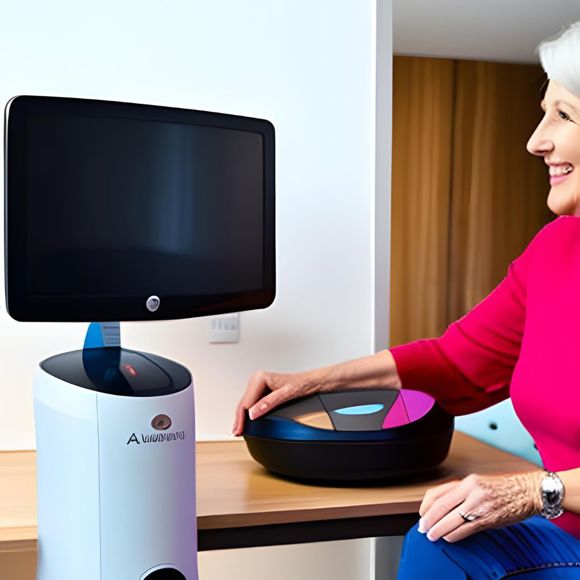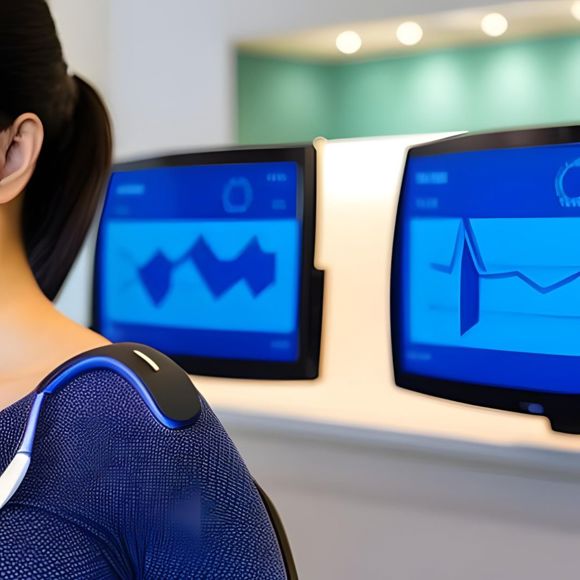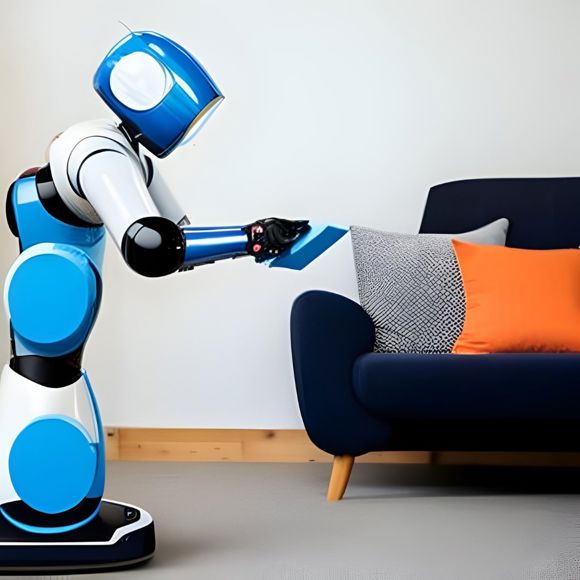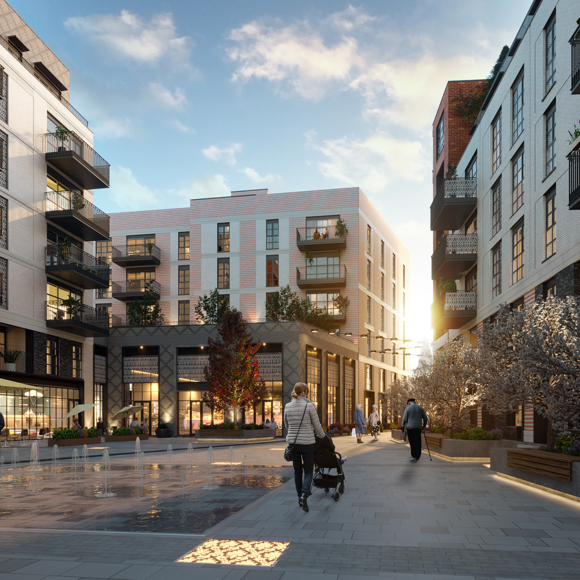
For each generation retirement may look a little different; as interests and habits change over time, it’s only natural that these affect the way we enjoy retirement.
Our Thrive Living collection aims to be at the forefront of innovation within the retirement community, so we wanted to provide insight into the ways in which retired living could look 50 years from now.
Using technology and AI our experts have researched what the future of retired living looks like for over 65s. We’re excited to reveal how AI could enhance the communities that we’re building together with our residents, now and in the future. AI has been used to review past trends and future forecasting to compile a picture of future living in the year 2073. AI design tools were then used to visualise these future communities.
The ways AI sees retired living in 2073:
1. Sustainable energy will be most popular
Of course, sustainability will play a core role in how we power all homes in the future, but it’ll be no different when it comes to retirement communities. AI predicts the following will be core energy sources to power homes: wind, hydropower, geothermal, biomass, ocean, hydrogen, nuclear and solar. Our sustainability blueprint already sees us using renewable energy across our new developments.
2. VR headsets and intuitive technology will lead the way for entertainment and leisure
In 50 years’ time, most of those over the age of 65 will have grown up with the internet and will be digitally savvy. This natural affinity with technology, will impact the ways in which we will consume media and find sources of entertainment as we age.
According to AI predictions, the following will be integral to entertainment in the future:
- Virtual and Augmented Reality
Immersive technologies like VR and AR will allow retirees to explore virtual worlds, attend cultural events and interact with loved ones in virtual environments. This wwill be of particular importance for people with mobility issues and those whose relatives live far away. - Virtual Cultural Experiences
Retirees will attend virtual museums, concerts, and art galleries, expanding their cultural experiences from the comfort of their homes. - Immersive Stories
VR storytelling will allow retired people to immerse themselves in fictional worlds or visit historical events, providing entertainment and mental stimulation. - Immersive Social Platforms
VR-enabled social media platforms will allow older people to engage in shared virtual spaces, play games, and interact with friends and family in a more immersive manner.

Stewart Bailey, Managing Director at Virtual Viewing comments:
“I’d agree with the predicted advancements identified by AI. Technology will be significantly more advanced. Almost exclusively delivered via MR, if not cognitive implants. Over 65s will want to share experiences with a wide network of friends and family. Location and mobility should not be a hinderance in any way. We suspect there will be a high demand for entertainment services for families, especially grandchildren. Enriching the family bonds and support network will be expected.”
3. Virtual travel and space exploration will become the new normal
VR opens many doors for virtual travel experiences for retirees. Hopefully, by retirement age people will have had a great opportunity to see the world and experience new cultures, but if health and mobility provide a barrier, then VR travel would be a fantastic solution to give them new world experiences.
Here’s what AI predicts will be the future of travel and holidays for retired people:
- Virtual Travel
Retired people with limited mobility will experience virtual travel to their favourite locations. Not only will they be able to visit any location, but they will also visit any time in history. - Memory Re-enactment
There is the potential that technology will allow memories to be stored and revisited using VR technology. Moments or experiences could be recorded prior and projected using technology to allow people to relive their favourite family holidays for years to come. - Real-Time Translation
AI-driven language translation will enable seamless communication with local people in different countries who speak different languages. - Space Travel
Commercial space travel could become a reality, enabling adventurous travellers to journey beyond Earth's atmosphere and experience weightlessness in space.
4. Virtual communication will help retirees keep in touch with family
If there was one lesson learnt from lockdown it’s how technology can help us communicate when we can’t always meet face-to-face. The habit of virtual communication will become more popular in years to come.
Look at how communication will look in retirement communities in the future, as predicted by AI:
- Holographic Communication
Future technology will enable holographic communication, allowing people to have lifelike conversations with friends and family members. - Realistic Avatars
Video calls will involve realistic avatars that mimic facial expressions and gestures. - Gesture Controls
Future interfaces will respond to hand gestures and movements, enabling intuitive communication. This would open up opportunities for people with illnesses impacting their speech. - AI Virtual Companions
AI-driven conversational agents could provide companionship, engage in meaningful conversations, and assist with daily tasks. - Emotional Insights
AI could analyse facial expressions, tone of voice and gestures to detect emotions and provide suggestions for improving communication.

5. Robotic assistants will support everyday living
In later life you may need assistance in some areas of everyday life. According to AI, our lives will become better supported by robotics and smart technology which will save us time and ensure daily tasks are ticked off.
According to AI, this is what daily life will look like for older people:
- E-Commerce Delivery and Virtual Assistants
AI-driven personal shopping assistants will find products, compare prices and make purchases. Drone and autonomous vehicle delivery services will become more popular. - Virtual Classes
VR platforms will offer interactive educational experiences, enabling over 65s to learn new skills and explore new hobbies. - Personalised Nutrition
AI-powered health monitoring will provide real-time insights into dietary needs, leading to personalised meal plans and recipes tailored to individual health profiles. - Smart Homes
Smart home technologies will become even more advanced, with AI-powered systems that adjust lighting, temperature and other factors for optimal comfort and safety. - Autonomous Vehicles
Self-driving cars and mobility services will offer safe and convenient transportation options for the older people.

- Smart Food Storage
Containers and refrigerators will be equipped with sensors that monitor inventory levels and expiration dates, automatically creating shopping lists and suggesting recipes based on available ingredients. - Hands-Free Operation
Smart home appliances will be controlled using voice commands, gestures, or even eye tracking, allowing users to navigate kitchen tasks without physical contact. - Temperature and Cooking Monitoring
Smart kitchen appliances will monitor cooking temperatures and times to prevent overcooking or undercooking. - Sleep Monitoring
Smart bedding and sleep monitoring devices will track sleep patterns, adjust mattress comfort levels, and create optimal sleeping environments. Brain-computer interfaces and relaxation technologies will aid in reducing stress and promoting restful sleep. - Smart Bathrooms
Bathrooms equipped with sensors and voice-activated controls will assist with tasks like running baths, monitoring water temperature, and providing reminders for medication. - Robotic Cleaning
Advanced robotic vacuum cleaners and mops will autonomously clean floors, while robot arms assist with dusting and tidying up.

6. Healthcare will be advanced by technology
Health monitoring systems for older people in the next 50 years could be highly advanced, leveraging the power of AI, IoT (Internet of Things), wearable devices, and other emerging technologies.
Here are some types of health monitoring systems that AI predicts will benefit retirees:
- Telemedicine
We already have telephone appointments for GP services, the future sees VR platforms being used for virtual medical consultations. - Wearable Health Sensors
Smart clothing or implantable devices equipped with sensors will monitor vital signs such as heart rate, blood pressure, respiratory rate and body temperature. These devices will transmit data to healthcare professionals in real time. - AI-Driven Diagnostics
Advanced AI algorithms will analyse health data patterns to detect early signs of diseases or health conditions, enabling timely intervention and treatment. - Smart Medication Dispensers
IoT-enabled medication dispensers will provide reminders for taking medications, dispense the correct dosage and flag missed doses. - Brain-Computer Interfaces
Advanced brain-computer interfaces will monitor cognitive function and provide insights into changes. - AI-Generated Health Recommendations
AI systems will analyse health data to provide personalised advice on exercise, nutrition and lifestyle changes to support overall wellbeing. - Pain Management and Rehabilitation
VR experiences that create immersive and relaxing environments will be used to manage pain, reduce stress and promote relaxation. - Virtual Exercise
VR fitness programs tailored to the older people's needs will encourage regular physical activity to improve mobility.
7. Retirement villages will be eco-friendly and offer community integration
In 50 years, retirement homes could see integrated advanced technologies, architectural innovations and a more holistic approach to the wellbeing of residents, predicts AI. We believe this will enhance the already-existing communities that we are building.
Some of the key ways retirement communities will be impacted include:
- Eco-friendly architecture including solar panels and green roofs;
- Smart Infrastructure buildings with automated controls;
- Additional wellness centres for fitness, spa treatments, yoga and more;
- Urban design that prioritises accessibility and public community spaces;
- Virtual reality rooms for entertainment, mental health support or communication;
- More community hubs with cafes and entertainment spaces;
- Nature integration with connections to walking trails and outdoor activities in local areas;
- Volunteer programs and mentorship opportunities in the community to connect retirees with local schemes;
- Advanced safety measures: security systems with biometric access, surveillance, and emergency response mechanisms.

Tim Seddon, Chief Property Officer at Retirement Villages comments:
“We are committed to being net-zero carbon by 2030 and have planned to cut waste, grow biodiversity, and support social mobility. Our Thrive Living collection extends this - being whole of life net zero carbon, allowing us to offset our carbon emissions throughout the build process and beyond."
At our Chester development we’ve been using locally sourced bricks, supporting the local economy and reducing embodied carbon emissions (the amount of carbon emitted during construction).
We're also committed to enhancing our Chester development’s biodiversity by 21.5%, and are keen to keep Botanical Place on track to reduce on-site CO2 emissions by 60%.
Where this is unavoidable, we’ve created our decarbonisation fund. This is made up of our contributions to offset any carbon we use and will fund improving our existing 1,600 homes to help get them closer to net zero too.”

The Thrive Living collection will offer retirement village communities located in Chester in Cheshire, West Byfleet in Surrey and Tunbridge Wells in Kent. For all information take a look at our Thrive Living collection page.
Methodology
Chat Gpt and Canva AI were used to research what AI depicts the future of retirement village living to look like. The findings were cross-checked and visualised using AI design to bring the concepts to life.
